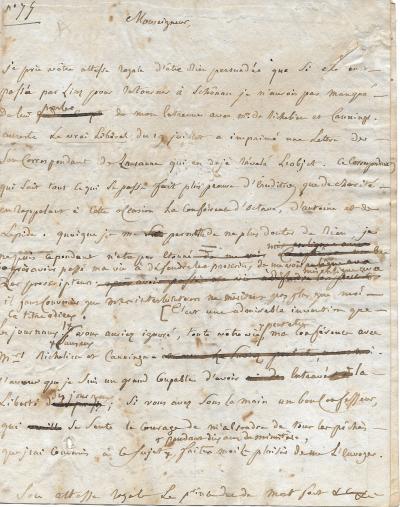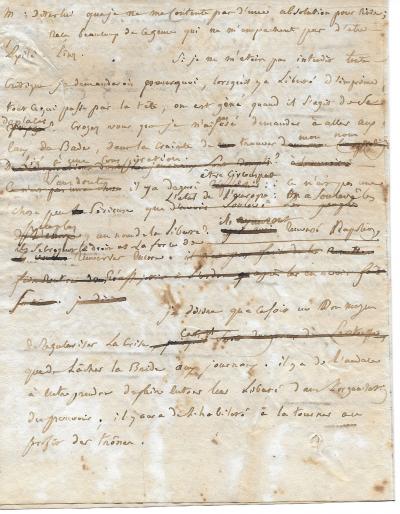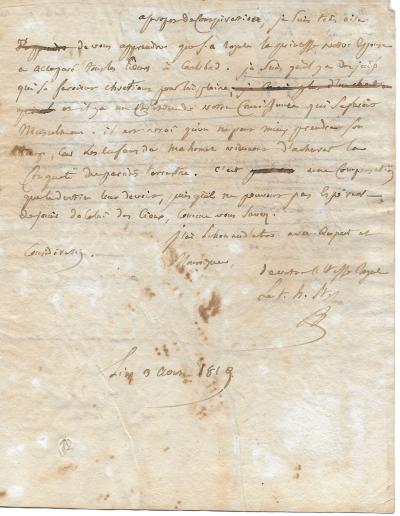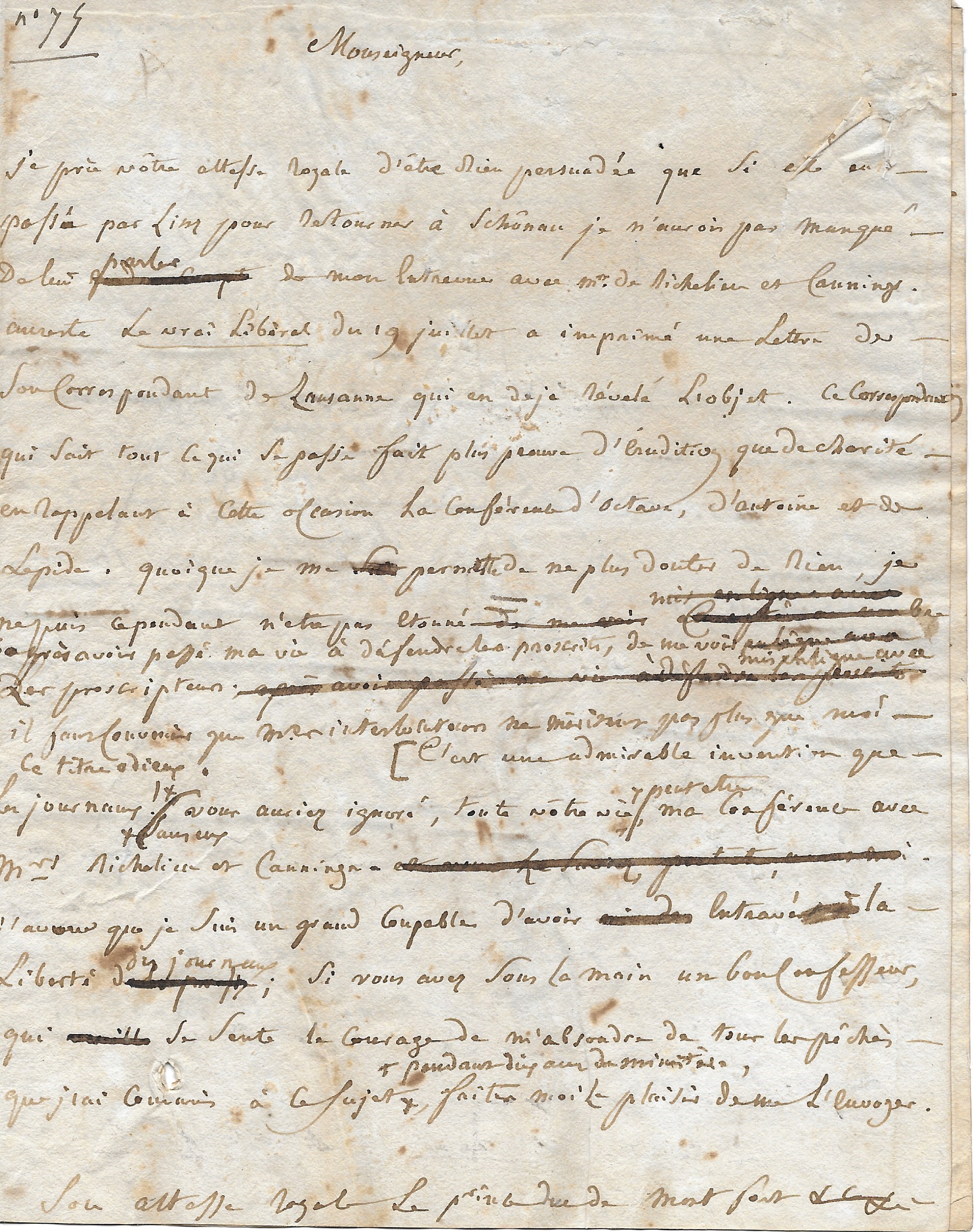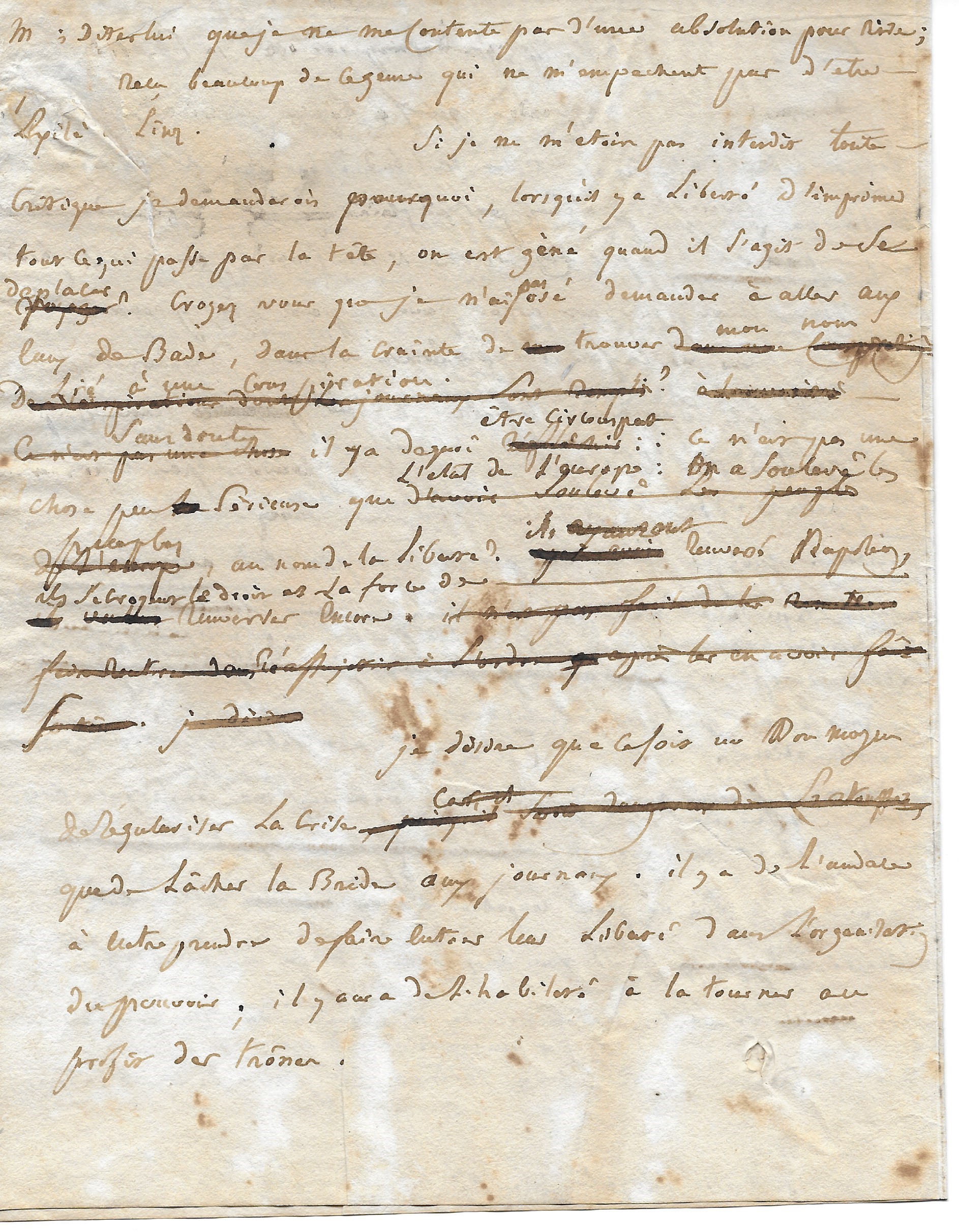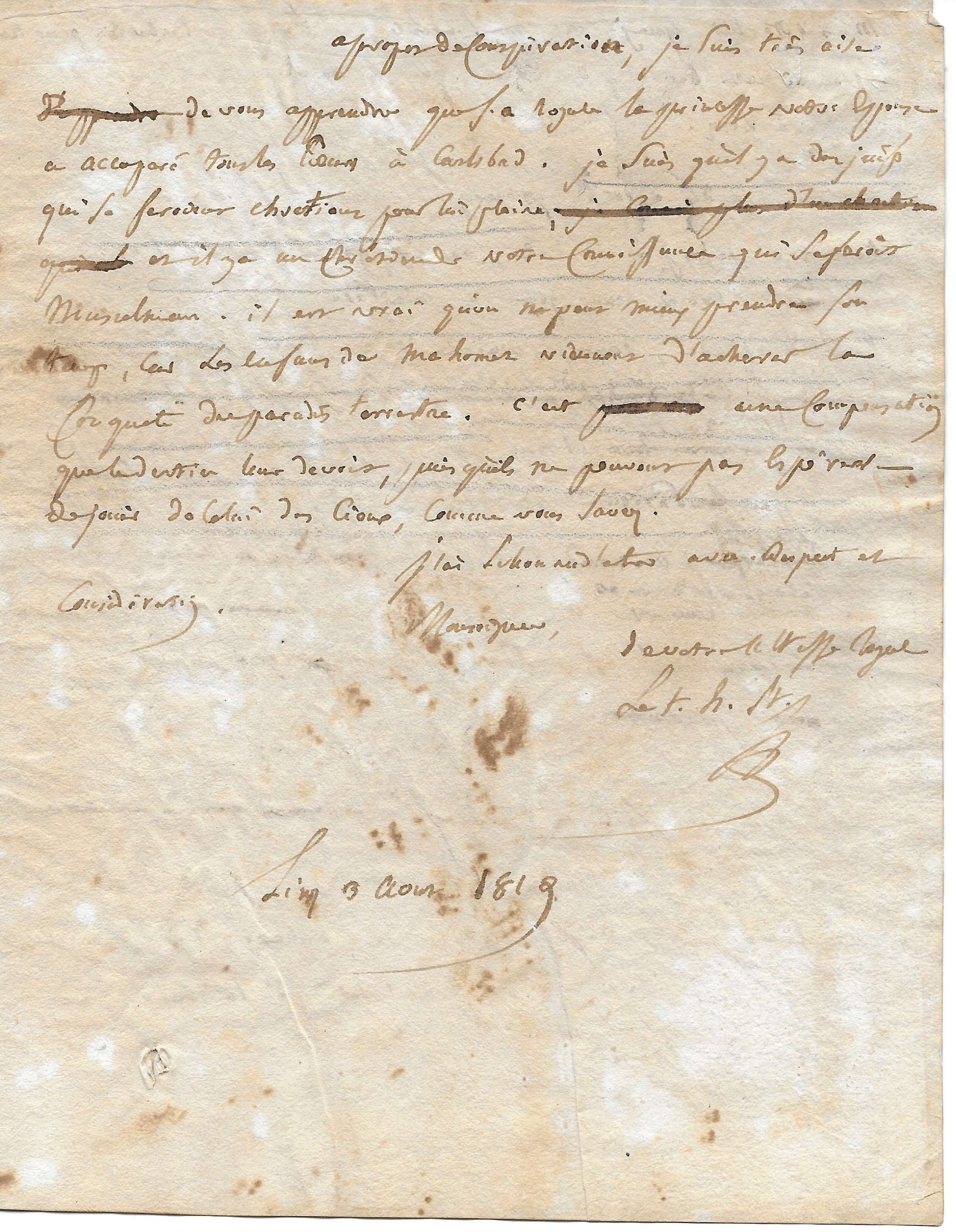Joseph FOUCHÉ - Autograph letter signed to Jérôme Bonaparte
Joseph FOUCHÉ, Duke of Otranto (1759 - 1820), Minister of the Empire
Autograph letter signed to Jérôme BONAPARTE. Linz (Austria), August 3, 1819; 2 pages 1/2 in-8 °.
Superb and long letter of exile addressed to the prince of Montfort, Jérôme Bonaparte, the youngest brother of Napoleon himself in exile with his wife near his father-in-law, the king of Wurtemberg. Letter in which it is mainly a question of Fouché's regret, when he was Minister of Police under the Empire, for not having left more freedom to the press: “Monsignor, I beg your Royal Highness to be fully persuaded that if she had gone through Linz to return to Schonau [Germany], I would not have failed to tell her about my interview with MM. de Richelieu and Canning. Besides, Le Vrai Libéral of July 19 printed a letter from its correspondent in Lausanne who has already revealed the subject. This correspondent, who knows everything that is happening, shows more erudition than charity, recalling on this occasion the conference of Octavian, Antoine and Lepidus. Although I allow myself to no longer doubt anything, I cannot however be surprised (sentence crossed out) after having spent my life defending outlaws, to see myself put in league with the proscribers. (sentence crossed out) It must be admitted that my interlocutors do not deserve this odious title any more than I do. Newspapers are an admirable invention! Without them you would have ignored all your life, maybe my lecture with MM. De Richelieu and Canning. (sentence crossed out) I admit that I am very guilty of having hindered the freedom of the press; if you have on hand a good confessor who feels the courage to absolve me of all the sins I have committed on this subject during ten years of ministry, please send him to me; but tell him that I am not satisfied with an absolution for fun: I have received many of this kind which does not prevent me from being exiled to Linz. If I hadn't forbidden myself any criticism, I would ask why, when there is freedom to print everything that comes through your head, you are embarrassed when it comes to moving? Do you think I dared not ask to go to Baden waters, for fear of finding my name linked to a conspiracy? (sentence crossed out) No doubt there is something to be wary of: it is not a little serious thing that the state of Europe, people have been raised in the name of freedom; they overthrew Napoleon, they believe they have the right and the strength to overthrow again. (sentence crossed out) I want it to be a good way to regulate the crisis (sentence crossed out) than to let go of the newspapers. There is daring in undertaking to bring their freedom into the organization of Power; there will be skill in turning it for the benefit of the thrones. Speaking of conspiracy, I am very glad to inform you that Her Royal Highness the Princess your wife has captured all hearts in Carlsbad. I know that there are Jews who would become Christians to please him (sentence crossed out) and there is a Christian you know who would become a Muslim. It is true that one cannot take better time, because the children of Mahomet have just completed the conquest of the terrestrial Paradise. It is a compensation that fate owed them, since they cannot hope to enjoy that of the heavens, as you know… ”
Letter appearing in the Memoirs and correspondence of King Jérôme (Dentu 1866, VII, page 385)
While he had been able to anticipate until now all the political events following the fall of the empire, Fouché was forced into exile, condemned for regicide following the promulgation of the law of January 12, 1816 in the initiative of King Louis XVIII, who amnestied Napoleon's support during the Hundred Days with the exception of members of his family and deputies who voted for the death of King Louis XVI and supported the emperor. Fouché spends the rest of his life defending himself from his actions in general indifference. He died in Trieste on December 26, 1820 having taken care to ask Jérôme Bonaparte to burn all his compromising papers.
Autograph letter signed to Jérôme BONAPARTE. Linz (Austria), August 3, 1819; 2 pages 1/2 in-8 °.
Superb and long letter of exile addressed to the prince of Montfort, Jérôme Bonaparte, the youngest brother of Napoleon himself in exile with his wife near his father-in-law, the king of Wurtemberg. Letter in which it is mainly a question of Fouché's regret, when he was Minister of Police under the Empire, for not having left more freedom to the press: “Monsignor, I beg your Royal Highness to be fully persuaded that if she had gone through Linz to return to Schonau [Germany], I would not have failed to tell her about my interview with MM. de Richelieu and Canning. Besides, Le Vrai Libéral of July 19 printed a letter from its correspondent in Lausanne who has already revealed the subject. This correspondent, who knows everything that is happening, shows more erudition than charity, recalling on this occasion the conference of Octavian, Antoine and Lepidus. Although I allow myself to no longer doubt anything, I cannot however be surprised (sentence crossed out) after having spent my life defending outlaws, to see myself put in league with the proscribers. (sentence crossed out) It must be admitted that my interlocutors do not deserve this odious title any more than I do. Newspapers are an admirable invention! Without them you would have ignored all your life, maybe my lecture with MM. De Richelieu and Canning. (sentence crossed out) I admit that I am very guilty of having hindered the freedom of the press; if you have on hand a good confessor who feels the courage to absolve me of all the sins I have committed on this subject during ten years of ministry, please send him to me; but tell him that I am not satisfied with an absolution for fun: I have received many of this kind which does not prevent me from being exiled to Linz. If I hadn't forbidden myself any criticism, I would ask why, when there is freedom to print everything that comes through your head, you are embarrassed when it comes to moving? Do you think I dared not ask to go to Baden waters, for fear of finding my name linked to a conspiracy? (sentence crossed out) No doubt there is something to be wary of: it is not a little serious thing that the state of Europe, people have been raised in the name of freedom; they overthrew Napoleon, they believe they have the right and the strength to overthrow again. (sentence crossed out) I want it to be a good way to regulate the crisis (sentence crossed out) than to let go of the newspapers. There is daring in undertaking to bring their freedom into the organization of Power; there will be skill in turning it for the benefit of the thrones. Speaking of conspiracy, I am very glad to inform you that Her Royal Highness the Princess your wife has captured all hearts in Carlsbad. I know that there are Jews who would become Christians to please him (sentence crossed out) and there is a Christian you know who would become a Muslim. It is true that one cannot take better time, because the children of Mahomet have just completed the conquest of the terrestrial Paradise. It is a compensation that fate owed them, since they cannot hope to enjoy that of the heavens, as you know… ”
Letter appearing in the Memoirs and correspondence of King Jérôme (Dentu 1866, VII, page 385)
While he had been able to anticipate until now all the political events following the fall of the empire, Fouché was forced into exile, condemned for regicide following the promulgation of the law of January 12, 1816 in the initiative of King Louis XVIII, who amnestied Napoleon's support during the Hundred Days with the exception of members of his family and deputies who voted for the death of King Louis XVI and supported the emperor. Fouché spends the rest of his life defending himself from his actions in general indifference. He died in Trieste on December 26, 1820 having taken care to ask Jérôme Bonaparte to burn all his compromising papers.
This description has been translated automatically. please click here Click here to display the original language FR
Sold
This item is not available. Please click on « View the catalog » to see similar items available.
Delivery France:
30.00 € incl. VAT (*)
Country prices, click on See
See more
Hotline
Please contact us for any question regarding this object. For any other inquiry, we invite you to fill the contact form.
Other items from the category « Autographs »
